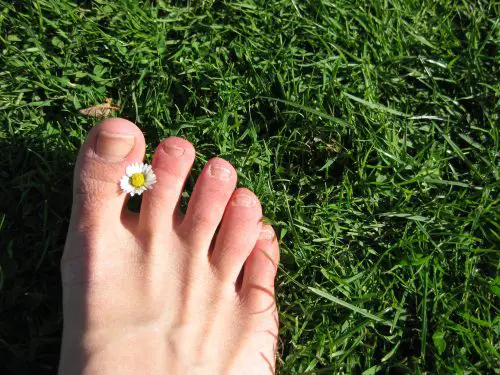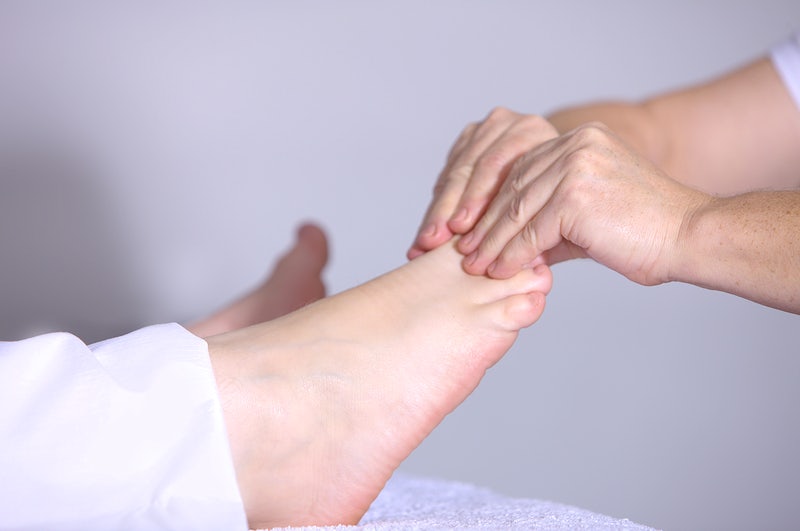Have you ever felt numbness or tingling in your toes ? Or a feeling of needles in the foot? You may have a pinched nerve. But what is the connection between a pinched nerve and numb toes? Is it possible to suffer from both conditions at the same time?
In this article, we will explore the possible link between the numb toes et a pinched nerve. We'll also cover how to determine the cause of your problems and what treatment options are available.
The Nerves of the Leg and Foot: A Short Anatomy Lesson
The body nerves human are responsible for transmitting messages between the brain and the rest of the body. These messages can be sensory, motor or autonomic nature.
The sensory nerves transmit information about touch, temperature, pain and other body stimuli to the brain. Autonomic nerves control involuntary functions like heart rate and digestion.
Many nerves run through the leg and some of them can potentially cause foot and toe paresthesia. In theory, any compressed or irritated nerve can lead to paresthesia.
However, the nerves most commonly associated with paresthesia of the foot and toes are:
- The most common nerve is the nerf sciatica (which starts from the lower back and goes down to the feet);
- Le peroneal nerve (which runs along the outer side of the leg);
- Le tibial nerve (running down the inside of the leg);
- Le sural nerve (which runs along the back of the leg).
La paresthesia can also be caused by compression of these nerves, which can occur for a variety of reasons such as trauma, prolonged sitting or standing, repetitive motions, or wearing ill-fitting shoes.
In most cases, paresthesias go away on their own over time, but if they are severe or persist for more than a few weeks, it is important to see a doctor to rule out other causes.
Numb toes, definition
Numbness of the toes is defined as a loss of sensation in the toes. Although there can be several potential causes (which will be discussed below), most often numbness is caused by nerve irritation or restricted blood flow in the toes.
It is important to be able to tell the difference between numbness and paralysis. Numbness refers only to loss of sensation, whereas paralysis involves loss of movement (whether or not accompanied by the sensation of numbness).
According to medical experts, toe numbness is usually not a sign of a serious illness.
However, if numbness persists for an extended period of time or if accompanied by other symptoms (such as tingling, weakness, or paralysis), it may be a sign of a more serious problem and should be evaluated by a healthcare professional.
Here are some possible causes of toe numbness:
- poor circulation. This can be due to a variety of factors, including smoking, obesity, or diabetes.
- Nerve compression. This can happen when nerves are pinched or compressed, such as when wearing ill-fitting shoes or during certain activities (such as crossing your legs for long periods of time).
- A pinched nerve or direct injury to the foot can lead to numbness in the toes. Infection
If you have a foot infection, it can cause inflammation and/or nerve damage, leading to numbness.
Is a numb toe from a pinched nerve?
Although theoretically a nerve may be pinched, or compressed, if caught between two bones or other hard surfaces. However, this is a rare case that requires significant trauma.
The idea that a pinched nerve can cause toe numbness is a myth. Symptoms associated with a pinched nerve, such as numbness, tingling, and pain, may be caused by other factors.
Rather than being caused by a pinched nerve, these symptoms are usually due to nerve irritation.
Irritation of a nerve can be caused by different factors, including inflammation, direct pressure, or even stretching. When a nerve is irritated, it interferes with the transmission of nerve impulses and causes the characteristic symptoms.
Numbness in the toes: What to do?
Since the nerve is not stuck as such in most cases, there is no need to try to unblock it. You must first consult a health professional for an evaluation. He or she will likely perform a physical exam and order tests (such asMRI or EMG).
The care will then be adapted according to the cause, and may include:
pharmaceuticals
The treatment of toe numbness due to pinched nerve varies depending on the underlying cause.
- Analgesics: over-the-counter medications, such as ibuprofen (Advil) or acetaminophen (Tylenol), can help relieve pain and inflammation.
- Prescription drugs: If over-the-counter medications aren't effective, your healthcare professional may prescribe stronger medications, such as steroids or tricyclic antidepressants.
Physiotherapy and osteo
La physiotherapy can be an effective treatment for a number of conditions, including numb toes and pinched nerves. The goal of physiotherapy is to help the patient regain their movements and functions.
This can be done through a variety of methods, including exercises, massages, and heat treatments. Physical therapy can also help improve circulation and reduce pain.
In some cases, physiotherapy can be combined with osteopathic treatment. Osteopathy is a system of medicine that focuses on the treatment of the musculoskeletal system.
The osteopaths use a variety of techniques, including manipulation, to improve the functioning of the musculoskeletal system. When used in combination, these two modalities can provide significant pain relief and improved functioning.
Diet change
A change in diet can be an interesting therapeutic option for thenumb toe and pinched nerve.
When you suffer from these problems, it is important to eat foods rich in nutrients and low in fat. You should also eat plenty of fresh fruits and vegetables. These foods will help reduce inflammation and pain.
Also, you should avoid processed foods, sugary drinks, and caffeine. These substances can make your symptoms worse.
Infiltration
Infiltration is a painkiller treatment that involves injecting medication directly into the affected area. This allows the drug to more effectively target the source of pain and provide faster and longer lasting relief.
Infiltration is sometimes used for conditions such as toe numbness and pinched nerve, as well as pain caused by injury or surgery.
In some cases, infiltration can also be used to administer drugs that are not available in oral form, such as chemotherapy drugs.
The site of infiltration will depend on the cause. It can be at the lumbar level, in the lower limb or directly on the foot.




